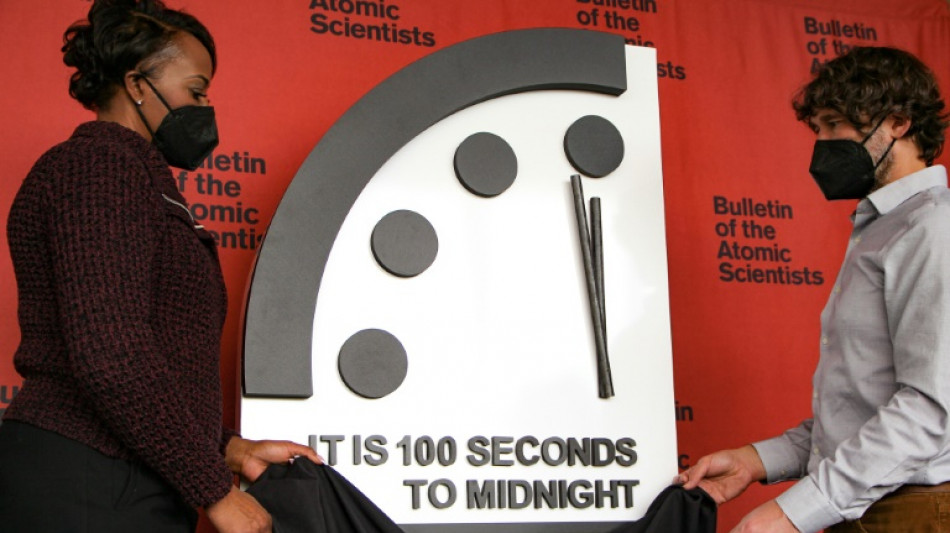
-
 Vonn to provide injury update as Milan-Cortina Olympics near
Vonn to provide injury update as Milan-Cortina Olympics near
-
France summons Musk for 'voluntary interview', raids X offices

-
 Stocks mostly climb as gold recovers
Stocks mostly climb as gold recovers
-
US judge to hear request for 'immediate takedown' of Epstein files

-
 Russia resumes large-scale strikes on Ukraine in glacial temperatures
Russia resumes large-scale strikes on Ukraine in glacial temperatures
-
Fit-again France captain Dupont partners Jalibert against Ireland

-
 French summons Musk for 'voluntary interview' as authorities raid X offices
French summons Musk for 'voluntary interview' as authorities raid X offices
-
IOC chief Coventry calls for focus on sport, not politics

-
 McNeil's partner hits out at 'brutal' football industry after Palace move collapses
McNeil's partner hits out at 'brutal' football industry after Palace move collapses
-
Proud moment as Prendergast brothers picked to start for Ireland

-
 Germany has highest share of older workers in EU
Germany has highest share of older workers in EU
-
Teen swims four hours to save family lost at sea off Australia

-
 Ethiopia denies Trump claim mega-dam was financed by US
Ethiopia denies Trump claim mega-dam was financed by US
-
Norway crown princess's son pleads not guilty to rapes as trial opens

-
 Russia resumes strikes on freezing Ukrainian capital ahead of talks
Russia resumes strikes on freezing Ukrainian capital ahead of talks
-
Malaysian court acquits French man on drug charges

-
 Switch 2 sales boost Nintendo profits, but chip shortage looms
Switch 2 sales boost Nintendo profits, but chip shortage looms
-
China to ban hidden car door handles, setting new safety standards

-
 Switch 2 sales boost Nintendo results but chip shortage looms
Switch 2 sales boost Nintendo results but chip shortage looms
-
From rations to G20's doorstep: Poland savours economic 'miracle'

-
 Russia resumes strikes on freezing Ukrainian capital
Russia resumes strikes on freezing Ukrainian capital
-
'Way too far': Latino Trump voters shocked by Minneapolis crackdown

-
 England and Brook seek redemption at T20 World Cup
England and Brook seek redemption at T20 World Cup
-
Coach Gambhir under pressure as India aim for back-to-back T20 triumphs

-
 'Helmets off': NFL stars open up as Super Bowl circus begins
'Helmets off': NFL stars open up as Super Bowl circus begins
-
Japan coach Jones says 'fair' World Cup schedule helps small teams

-
 Equities and precious metals rebound after Asia-wide rout
Equities and precious metals rebound after Asia-wide rout
-
Do not write Ireland off as a rugby force, says ex-prop Ross

-
 Winter Olympics 2026: AFP guide to Alpine Skiing races
Winter Olympics 2026: AFP guide to Alpine Skiing races
-
Winter Olympics to showcase Italian venues and global tensions

-
 Buoyant England eager to end Franco-Irish grip on Six Nations
Buoyant England eager to end Franco-Irish grip on Six Nations
-
China to ban hidden car door handles in industry shift

-
 Sengun leads Rockets past Pacers, Ball leads Hornets fightback
Sengun leads Rockets past Pacers, Ball leads Hornets fightback
-
Waymo raises $16 bn to fuel global robotaxi expansion

-
 Netflix to livestream BTS comeback concert in K-pop mega event
Netflix to livestream BTS comeback concert in K-pop mega event
-
Rural India powers global AI models

-
 US House to vote Tuesday to end shutdown
US House to vote Tuesday to end shutdown
-
Equities, metals, oil rebound after Asia-wide rout

-
 Bencic, Svitolina make history as mothers inside tennis top 10
Bencic, Svitolina make history as mothers inside tennis top 10
-
Italy's spread-out Olympics face transport challenge

-
 Son of Norway crown princess stands trial for multiple rapes
Son of Norway crown princess stands trial for multiple rapes
-
Side hustle: Part-time refs take charge of Super Bowl

-
 Paying for a selfie: Rome starts charging for Trevi Fountain
Paying for a selfie: Rome starts charging for Trevi Fountain
-
Faced with Trump, Pope Leo opts for indirect diplomacy

-
 NFL chief expects Bad Bunny to unite Super Bowl audience
NFL chief expects Bad Bunny to unite Super Bowl audience
-
Australia's Hazlewood to miss start of T20 World Cup

-
 Bill, Hillary Clinton to testify in US House Epstein probe
Bill, Hillary Clinton to testify in US House Epstein probe
-
Cuba confirms 'communications' with US, but says no negotiations yet

-
 Iran orders talks with US as Trump warns of 'bad things' if no deal reached
Iran orders talks with US as Trump warns of 'bad things' if no deal reached
-
From 'watch his ass' to White House talks for Trump and Petro


Glimmers of hope, but Doomsday Clock stuck at 100 seconds to midnight
The "Doomsday Clock," representing the judgment of leading science and security experts about perils to human existence, remains at 100 seconds to midnight this year, with advances like Covid-19 vaccines balanced by rising misinformation and other threats.
Bulletin of the Atomic Scientists president Rachel Bronson declared Thursday the world was no safer this year than two years ago, when the clock's hands were moved to their current position.
"If humanity is to avoid an existential catastrophe, one that would dwarf anything it has yet seen, national leaders must do a far better job of countering disinformation, heeding science and cooperating," she told reporters on the 75th anniversary of the clock's initial unveiling.
The fact that it hasn't shifted closer to midnight does not imply threats have stabilized, the group said in a full statement.
"On the contrary, the Clock remains the closest it has ever been to civilization-ending apocalypse because the world remains stuck in an extremely dangerous moment."
The Bulletin was founded in 1945 by Albert Einstein, J Robert Oppenheimer and other scientists who worked on the Manhattan Project which produced the first nuclear weapons.
The idea of the clock symbolizing global vulnerability to catastrophe followed in 1947.
Its time is set by the organization's board, with the support of its board of sponsors, which includes 11 Nobel laureates.
In its statement, the Bulletin noted hopeful developments at the start of 2021, including the renewal of the New START arms control agreement between the United States and Russia.
But international tensions continue to loom ominously, including most recently over Ukraine. The United States, Russia and China meanwhile continue their march to develop hypersonic weapons.
- Nice words, but little climate action -
No country meanwhile remains immune to threats to democracy, the Bulletin said, "as the January 6, 2021 insurrection at the US Capitol demonstrated."
More than 10 percent of those charged with crimes related to the riot were active or retired service members, underscoring extremism in the military.
On climate, COP26 in Glasgow offered positive rhetoric but relatively little action.
Encouragingly, several countries announced net-zero carbon dioxide targets by 2050, but getting there would require immediate divestment from fossil fuels, investment in renewables, upgrading infrastructure and shifting land use and agriculture practices.
"The past year has seen a staggering onslaught of climate disasters," said Raymond Pierrehumber, a professor of physics at the University of Oxford.
"We've had the heat dome over North America, worldwide fires, drought, floods, but this is just a sample of what is to come if we don't get the emissions of carbon dioxide to zero."
And while Covid-19 has focused the world's scientific attention, governments must be prepared for other biological threats -- from weapons programs to the rise in antibiotic resistance, which the Bulletin said could trigger a new pandemic within a decade.
The Bulletin particularly highlighted how disinformation -- much of it stoked by politicians in high office -- is undermining faith in science and handicapping the world's ability to confront its challenges.
"A particularly invidious threat is the intentional undermining of the public's ability to sort out what's true from what's patently false by information warfare," said Sharon Squassoni, co-chair of the board and a research professor at George Washington University.
"This subverts our ability to arrive at consensus on the solutions needed to achieve positive change," she added.
The Bulletin called on Washington and Moscow to expand the scope of nuclear reduction, and for the world's leading polluters to accelerate decarbonization.
"China should set an example by pursuing sustainable development pathways -- not fossil fuel-intensive projects" in its global infrastructure initiative known as Belt and Road, it said.
The United States and other leading countries should meanwhile heighten cooperation through the World Health Organization to reduce biological risks.
This would involve improving monitoring of animal-human interactions, increasing international disease surveillance, and ramping up production and distribution of medical supplies.
D.Khalil--SF-PST



